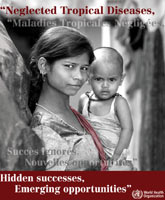UN agency unveils two web projects to fight disease and track medical progress
19-04-2007 (New York)

Neglected Tropical Diseases poster
© WHO
Two web projects backed by the United Nations World Health Organization (WHO) were launched this week as part of global efforts to fight infectious diseases afflicting the developing world and to track recent progress made in the field of medicine.
The new Drug Target Prioritization Database will allow researchers from all over the world to cull their knowledge in finding cures to diseases – including malaria, tuberculosis, African sleeping sickness and worm infections – which are in dire need of new treatments.
These infectious diseases infect billions of people in poor countries and kill more than 6 million annually. Given the limited resources for drug research and development in the developing world, it is hoped that the new online network, established by the WHO-backed Special Programme for Research and Training in Tropical Diseases, will improve the situation.
The new online network “provides an outstanding example of how WHO can bring together multiple groups to develop joint solutions,” said Programme Director Dr. Robert Ridley, TDR Director.
Another web project is an online database, similar to the popular Wikipedia. It aims to update global medical and health statistics.
The last version of the International Classification of Diseases (ICD) – the worldwide standard for classifying mortality and morbidity, or information related to deaths, illness and injury – was adopted in 1990 by all WHO Member States, and the overhauled version will allow registered users to submit information and evidence.
Registered users will be able to submit scientific input online, which will then be vetted by expert groups and will be subject to a strict editorial process.
The ICD was created in the 19th century and was taken over by WHO in 1948. The meeting of the steering group overseeing the revision concluded on 18 April in Japan.
These infectious diseases infect billions of people in poor countries and kill more than 6 million annually. Given the limited resources for drug research and development in the developing world, it is hoped that the new online network, established by the WHO-backed Special Programme for Research and Training in Tropical Diseases, will improve the situation.
The new online network “provides an outstanding example of how WHO can bring together multiple groups to develop joint solutions,” said Programme Director Dr. Robert Ridley, TDR Director.
Another web project is an online database, similar to the popular Wikipedia. It aims to update global medical and health statistics.
The last version of the International Classification of Diseases (ICD) – the worldwide standard for classifying mortality and morbidity, or information related to deaths, illness and injury – was adopted in 1990 by all WHO Member States, and the overhauled version will allow registered users to submit information and evidence.
Registered users will be able to submit scientific input online, which will then be vetted by expert groups and will be subject to a strict editorial process.
The ICD was created in the 19th century and was taken over by WHO in 1948. The meeting of the steering group overseeing the revision concluded on 18 April in Japan.
Related themes/countries
· Access to Information: News Archives 2007
· Capacity Building: News Archives 2007
Share this story:
Contact information
- UN
Source















